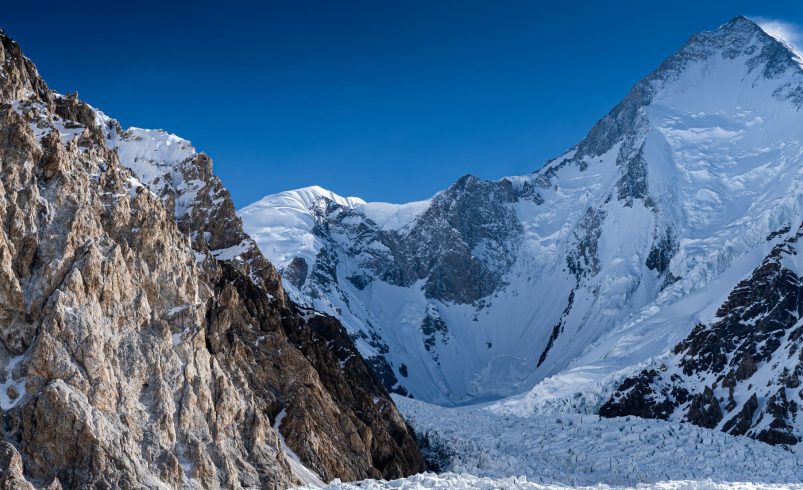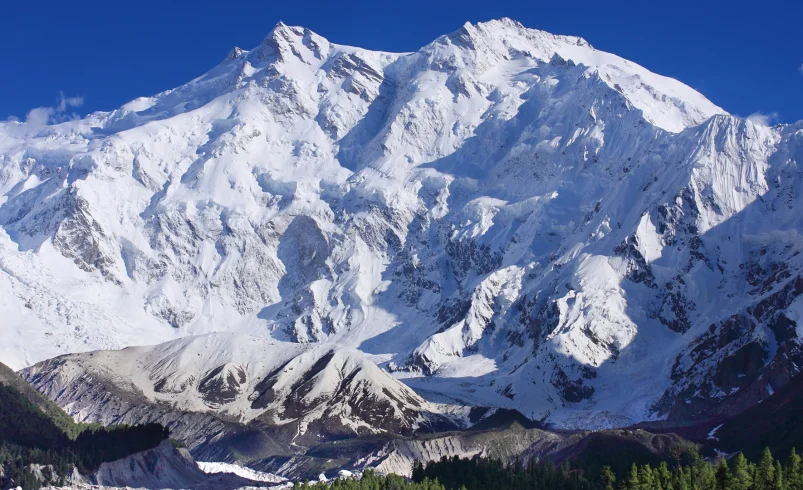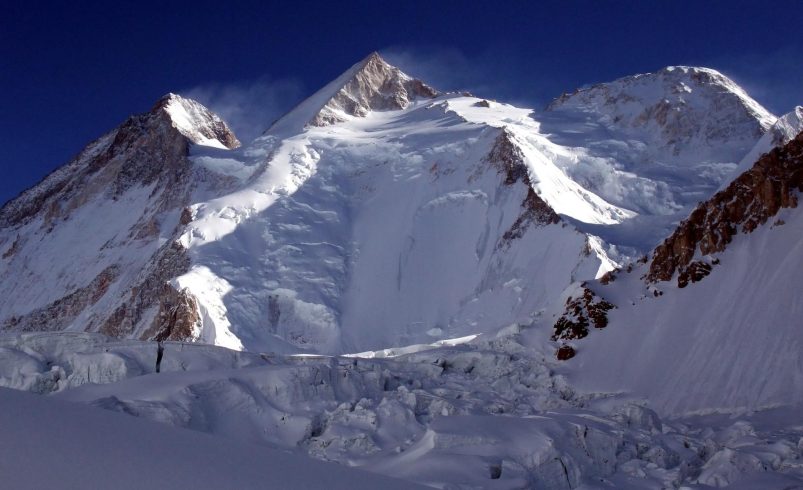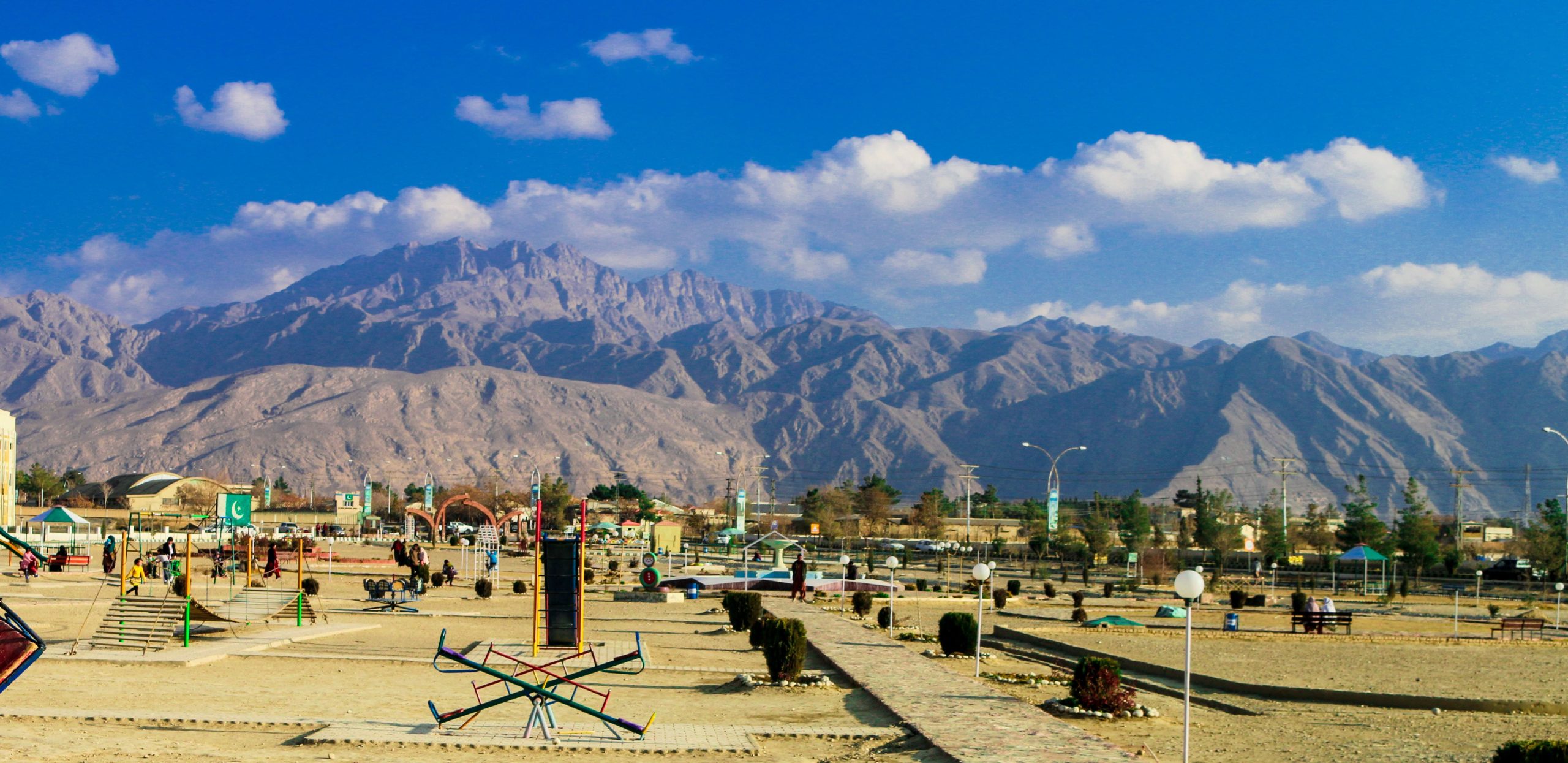
- July 23, 2025
🏔️ Introduction
Gasherbrum I is an iconic and majestic 8,080-meter peak located in the Karakoram Range on the border of Pakistan and China. Recognized as the 11th highest mountain in the world, it is commonly known as the Hidden Peak due to its secluded position behind a ridge that conceals it from view until approached closely. The mountain resides within Gilgit-Baltistan, the mountaineering heartland of Pakistan, and forms part of the Gasherbrum massif, which includes Gasherbrum II, III, IV, and other subsidiary peaks.
Unlike commercialized peaks like Everest, Gasherbrum I offers a remote and raw climbing experience suitable for elite climbers. The challenge lies in not only the height and cold but also the sheer remoteness, logistical complexities, and physical exhaustion. For mountaineers and adventurers, climbing this mountain is a badge of honor that demands unparalleled determination, strategy, and endurance.
🏠 Historical Significance and First Ascent
The word “Gasherbrum” is derived from the Balti language meaning “beautiful mountain” rather than the oft-assumed “Shining Wall.” Gasherbrum I was first identified and named by Thomas George Montgomerie in 1856 as part of the Great Trigonometric Survey of British India.
The first successful ascent of Gasherbrum I was made on July 5, 1958, by Americans Pete Schoening and Andy Kauffman, members of a large American expedition led by Nicholas Clinch. They ascended via the Northwest Face, which remains the most frequently used route today.
Numerous subsequent ascents have added to the legacy of the Hidden Peak, including winter ascents, solo climbs, and Alpine-style expeditions.
🌍 Location and Access from Islamabad
Gasherbrum I is located in the remote Shigar District of Gilgit-Baltistan, northeast of Skardu, and accessed primarily through the Baltoro Glacier route.
Travel Route from Islamabad to Base Camp:
| From | Mode | Destination | Distance/Time |
|---|---|---|---|
| Islamabad | Flight | Skardu | 1 hour |
| Skardu | Jeep | Askole | 6-8 hours |
| Askole | Trek | Paiju | 2 days |
| Paiju | Trek | Urdukas | 2 days |
| Urdukas | Trek | Goro II | 1 day |
| Goro II | Trek | Concordia | 1 day |
| Concordia | Trek | Gasherbrum BC | 2 days |
Expect a total of 7–10 days of trekking to reach the Gasherbrum Base Camp depending on acclimatization and weather.
📅 Best Time for Climbing Gasherbrum I
The optimal climbing window for Gasherbrum I falls between mid-June and early August. During this time:
- The weather is relatively stable with fewer storms.
- Snow conditions allow for better traction and route finding.
- Wind speeds are manageable at higher altitudes.
- Base Camp is fully functional with porters, cooks, and logistics teams.
Climbing outside these months drastically increases the risks of avalanches, frostbite, and summit failure.
⛹️ Expedition Routes and Technical Challenges
Common Ascent Routes:
- Northwest Face/West Ridge (Normal Route): First ascent route used in 1958
- Japanese Couloir Route: Technical and avalanche-prone
- Southwest Ridge: Rarely used, more complex
High Camps Setup:
- Base Camp (5,000 m)
- Camp I (5,900 m)
- Camp II (6,400 m)
- Camp III (7,200 m)
- Summit (8,080 m)
Challenges:
- Crevasses and seracs along the glacier
- Technical ice climbing sections
- High winds at summit ridge
- Altitude-related illnesses
- Extended exposure to sub-zero conditions
🏛️ Expedition Statistics and Notable Records
- First Ascent: 1958 (USA Team)
- First Pakistani Ascent: Nazir Sabir in 1992
- Winter Ascent: Simone Moro and Denis Urubko in 2012
- Solo Ascent: Reinhold Messner (1984)
- Fastest Known Time: N/A (limited data due to low commercial traffic)
🏨 Where to Stay During the Journey
In Skardu:
- Hotel One Skardu
- PTDC Motel Skardu
- Shangrila Resort
- Serena Shigar Fort
During Trek:
- Tented accommodations with support staff at key campsites: Paiju, Urdukas, Goro II, Concordia
At Base Camp:
- Expedition-style tenting
- Group kitchen tents
- Communication and logistics tents
🍽️ What to Eat on the Trek and Expedition
Local Delights in Skardu:
- Chapshuro (Balti meat pie)
- Mamtu (meat dumplings)
- Butter tea
- Apricot soup
On the Trek:
- Dal with rice/chapati
- Boiled eggs, canned meats
- Dry fruits, nuts, and chocolate
- Hydration powders and energy drinks
During the Climb:
- Freeze-dried high-altitude meals
- Protein bars, cheese, and instant noodles
Nutrition must be high-calorie, easily digestible, and energy-dense to withstand the exertion and cold.
💰 Estimated Costs for Climbing Gasherbrum I
| Item | Cost (PKR) |
| Permit Fee (Govt) | 800,000 |
| Liaison Officer & Insurance | 200,000 |
| Expedition Logistics | 1,200,000 |
| Guide and Porters | 400,000 |
| Domestic Flights | 60,000 |
| Trekking Gear Rental | 150,000 |
| Food & Supplies | 300,000 |
| Total Estimated Cost | 3.1 to 3.5 Million PKR |
Prices vary depending on operator, gear ownership, group size, and support level.
🗓️ Itinerary – Gasherbrum I Expedition
📅 Day 1: Arrival in Islamabad
Arrive in Islamabad, where you’ll meet your expedition team. After airport transfer, check into your hotel. The day ends with an initial briefing and equipment check.
📅 Day 2: Islamabad – Skardu
If weather allows, enjoy a scenic 1-hour flight to Skardu. Otherwise, prepare for a 2-day overland journey via the Karakoram Highway.
⛰️ Day 3: Acclimatization and Preparations in Skardu
Spend the day organizing permits, checking gear, and exploring Skardu’s local culture. Final logistics for the expedition are handled.
🚙 Day 4: Drive to Askole (Last Village)
Embark on a thrilling jeep ride through the Shigar Valley. Askole is the last inhabited village before the trekking begins.
🥾 Day 5: Trek from Askole to Jhola
Start your trek along the Braldu River, enjoying breathtaking views of the Karakoram. Camp overnight at Jhola.
🏕️ Day 6: Jhola to Paiju
Continue trekking toward Paiju, surrounded by stunning mountain landscapes. This is a key acclimatization point before approaching the glacier.
🏞️ Day 7: Rest and Acclimatization Day at Paiju
Take a full day to rest and acclimatize. Porters bake fresh bread and prep for the glacier route. Enjoy views of Baltoro Glacier.
🧭 Day 8: Paiju to Khoburse
The trek becomes more demanding as you step onto the Baltoro Glacier. Camp at Khoburse near the glacier’s edge.
❄️ Day 9: Khoburse to Urdukas
Trek along the rugged glacial terrain toward Urdukas. This campsite offers amazing views of the Trango Towers.
🏔️ Day 10: Urdukas to Goro II
Make your way further into the heart of the Karakoram to Goro II. The views of Masherbrum and Gasherbrum peaks begin to dominate.
🧊 Day 11: Goro II to Concordia
Arrive at Concordia, often called the “Throne Room of the Mountain Gods.” It offers 360-degree views of several 8,000m peaks.
⛺ Day 12: Concordia to Gasherbrum Base Camp
The trek to Gasherbrum I Base Camp begins. The route passes over rough glacial ice. Set up camp at the foot of the Hidden Peak.
🧗 Day 13–42: Climbing Period
This includes rotation climbs, acclimatization rounds, and final summit push. Weather, health, and snow conditions dictate flexibility. Typical rotations:
- Establish Camp I (~6,000m)
- Move to Camp II (~6,400m)
- Push to Camp III (~7,000m)
- Summit attempt (~8,080m)
- Descent and rest periods
🏕️ Day 43: Return to Concordia
After a successful summit and recovery at Base Camp, begin the return trek from Base Camp to Concordia.
🥾 Day 44: Trek to Goro II
Retrace your steps through the glacier as you descend. Camp again at Goro II.
🏞️ Day 45: Trek to Urdukas
Continue trekking downhill to Urdukas and enjoy lower altitude breathing.
🏕️ Day 46: Trek to Paiju
Arrive at Paiju. This night often includes celebration among climbers and porters.
🚙 Day 47: Paiju to Askole, then Drive to Skardu
Trek ends at Askole. From there, take the jeep back to Skardu and check into a hotel for some well-earned rest.
🛫 Day 48: Fly/Drive to Islamabad
Depending on weather, fly back or drive along the Karakoram Highway to Islamabad.
📝 Day 49: Debriefing and Free Day
Final debriefing at the Ministry of Tourism. Spend the rest of the day shopping or exploring Islamabad.
✈️ Day 50: International Departure
Transfer to Islamabad International Airport for your flight back home, concluding your Gasherbrum I expedition.
📏 Distance & Altitude Table for Key Trekking Segments
| Segment | Distance (Approx.) | Elevation Gain |
|---|---|---|
| Askole to Jhola | 20 km | +200 m |
| Jhola to Paiju | 19 km | +200 m |
| Paiju to Urdukas | 20 km | +650 m |
| Urdukas to Goro II | 12 km | +250 m |
| Goro II to Concordia | 12 km | +300 m |
| Concordia to BC | 10 km | +400 m |
| Total Trekking Distance | ~93 km | Up to 5,000m+ altitude |
✅ Key Notes:
- Duration: 50–55 days
- Climbing Days: 30–35 days (flexible)
- Rest & Buffer Days: 4–5 days (important for weather)
- Permit & Debrief: Must be done with Pakistan Tourism Dept.
- Recommended Support: Certified guide, cook, high-altitude porters
🏔️ Famous Summits of Gasherbrum I (Hidden Peak)
Gasherbrum I, also known as Hidden Peak, is the 11th highest mountain in the world at an elevation of 8,080 meters (26,510 feet). Its isolated and remote nature has attracted climbers from across the globe seeking a true high-altitude challenge. Below is a brief history of notable ascents:
🗻 First Ascent (1958)
- Date: July 5, 1958
- Team: An American expedition
- Summiteers: Pete Schoening and Andy Kauffman
- Route: Northwest Face via the Gasherbrum Glacier
- Significance: This was the first successful ascent of Gasherbrum I. The climb was historic as it marked one of the earliest American successes on an 8000-meter peak.
🗻 Reinhold Messner’s Solo (1984)
- Date: July 1984
- Climber: Reinhold Messner
- Achievement: First solo ascent without supplemental oxygen
- Style: Alpine style
- Significance: Messner’s ascent was groundbreaking and highlighted a minimalist approach, further cementing his legendary status in high-altitude mountaineering.
🗻 First Winter Ascent (2012)
- Date: March 9, 2012
- Team: Polish climbers
- Summiteers: Adam Bielecki and Janusz Gołąb
- Significance: This was the first winter ascent of Gasherbrum I. It was a major milestone in Himalayan winter climbing history.
🗻 Fastest Ascent Record
- Climber: Denis Urubko (Kazakhstan)
- Year: 2001
- Time: Roughly 7 days round trip (base camp to summit and back)
- Style: Alpine, without bottled oxygen
- Significance: One of the fastest ascents on an 8000-meter peak, demonstrating physical endurance and strategic acclimatization.
🗻 First Pakistani to Summit Gasherbrum I
- Climber: Nisar Hussain Sadpara
- Year: 1998
- Significance: One of the first known Pakistani climbers to successfully summit Gasherbrum I. He was from the famed mountaineering village of Sadpara, Skardu.
🗻 Other Notable Summits
- Simone Moro (Italy): Multiple ascents including attempts in alpine style.
- Hirotaka Takeuchi (Japan): One of the first Japanese climbers to summit in the early 2000s.
- Catherine Destivelle (France): Renowned female climber who attempted alpine-style climbs in the Karakoram, including Gasherbrum I.
🗻 Famous Summits Around Gasherbrum I
The Gasherbrum Massif, part of the Karakoram Range, is home to several of the world’s most dramatic and challenging peaks. While Gasherbrum I, also known as Hidden Peak, is itself a towering 8,080-meter summit, it lies in close proximity to several other famous summits that make this region a dream destination for elite mountaineers.
K2 (Mount Godwin-Austen)
- Elevation: 8,611 meters (28,251 ft)
- Rank: 2nd highest mountain in the world
- Distance from Gasherbrum I: ~35 km northeast
- Known For: Technical difficulty, extreme weather; often called the “Savage Mountain”
Broad Peak
- Elevation: 8,051 meters (26,414 ft)
- Rank: 12th highest mountain in the world
- Distance from Gasherbrum I: ~3 km
- Known For: Easy accessibility from Concordia; part of the Gasherbrum massif
Gasherbrum II
- Elevation: 8,035 meters (26,362 ft)
- Rank: 13th highest mountain in the world
- Distance from Gasherbrum I: ~5 km
- Known For: Slightly less technical than G-I; a common “starter” 8000er
Gasherbrum III
- Elevation: 7,952 meters (26,089 ft)
- Known For: Considered one of the highest unclimbed peaks until 1975
- Note: Technically a sub-peak, but very prominent
Gasherbrum IV
- Elevation: 7,925 meters (26,001 ft)
- Known For: Known as the “Shining Wall”; highly technical climb
- Distance: Shares the massif with G-I and G-II
Baltoro Kangri
- Elevation: 7,312 meters (23,990 ft)
- Known For: Often overlooked but offers stunning views of the Baltoro Glacier
- Location: Near the Baltoro Glacier, close to the Gasherbrum group
📊 Comparative Table of Famous Summits Around Gasherbrum I
| 🏔️ Summit Name | 🪜 Elevation (m) | 🗺️ Distance from G-I | 🌍 Location Highlights |
|---|---|---|---|
| K2 | 8,611 | ~35 km | 2nd highest mountain on Earth |
| Broad Peak | 8,051 | ~3 km | Popular for its ridgeline summit |
| Gasherbrum II | 8,035 | ~5 km | Easiest among the 8000ers in region |
| Gasherbrum III | 7,952 | ~3 km | Technically difficult & steep |
| Gasherbrum IV | 7,925 | ~2.5 km | Known for its Shining Wall |
| Baltoro Kangri | 7,312 | ~8 km | Great views of Baltoro Glacier |
🛂 Packing Checklist for Gasherbrum I
- Mountaineering boots (double insulated)
- Crampons, ice axe, ropes, jumar
- Down jacket (-30°C rated)
- Sleeping bag (-40°C rated)
- Four-season tent
- Headlamp and batteries
- Cooking set or high-altitude stove
- UV goggles and sunscreen
- Emergency beacon (Garmin InReach or SPOT)
⚠️ Emergency Contacts and Health Tips
Contacts:
- Alpine Club of Pakistan: +92 51 9252324
- Rescue 1122 GB: 1122
- Skardu DHQ Hospital: +92 5815 920161
Health Tips:
- Acclimatize with “climb high, sleep low”
- Monitor for HAPE and HACE
- Avoid over-exertion in early days
- Purify all drinking water
- Carry Diamox and altitude meds
🌍 Nearby Attractions and Peaks
- Gasherbrum II (8,035 m) – Often climbed as warm-up
- Broad Peak (8,051 m) – Neighboring 8000er
- K2 (8,611 m) – 3 days trek from Concordia
- Baltoro Glacier – Scenic glacial terrain
- Trango Towers – Popular with rock climbers
🛍️ Travel Tips for Gasherbrum I Expeditions
- Choose a reputed expedition operator
- Never compromise on safety gear
- Weather windows can close fast – be ready
- Carry extra batteries and solar chargers
- Expect communication blackouts
- Respect the local culture in Baltistan
- Tip porters generously
❓ FAQs
What is the best time to attempt climbing Gasherbrum I?
The ideal climbing season is between mid-June and early August, when weather conditions are most stable.
Is climbing Gasherbrum I safe for beginners?
No. Gasherbrum I is suitable only for expert climbers with previous experience on 6000m+ peaks.
Do I need a permit to climb Gasherbrum I?
Yes, a government-issued climbing permit and liaison officer are mandatory, coordinated via the Alpine Club of Pakistan.
How many days does it take to complete the Gasherbrum I expedition?
On average, an expedition lasts 45 to 55 days, including approach, acclimatization, and summit push.
Are there any helicopter rescue options?
Yes, but only in clear weather and at significant cost. Insurance covering helicopter evacuation is essential.
How cold does it get on Gasherbrum I?
Temperatures can drop to -35°C or lower near the summit. Wind chill makes it even colder.
What is the success rate of Gasherbrum I expeditions?
Average success rate is 40-50%, depending on weather, fitness, and logistics.
Can I rent climbing gear in Pakistan?
Some gear can be rented in Skardu or Islamabad, but bring essential items personally.
Is there mobile signal at base camp?
No. Only satellite communication works beyond Askole.
What is the oxygen requirement for Gasherbrum I?
Most climbers attempt without supplemental oxygen, though it is recommended for safety at high altitude.
🌟 Conclusion
Climbing Gasherbrum I is more than a physical journey – it is a battle of willpower, courage, and endurance. Rising over 8,000 meters into the heavens of the Karakoram, the Hidden Peak beckons those who seek solitude, challenge, and discovery. From the remote Baltoro Glacier trek to the oxygen-thin summit ridge, each step carries a tale of perseverance.
Whether you aim to conquer the Hidden Peak or simply marvel at its icy crown, the journey will remain etched in your memory forever. Come prepared, climb responsibly, and let Gasherbrum I transform your adventure into a lifelong triumph.






